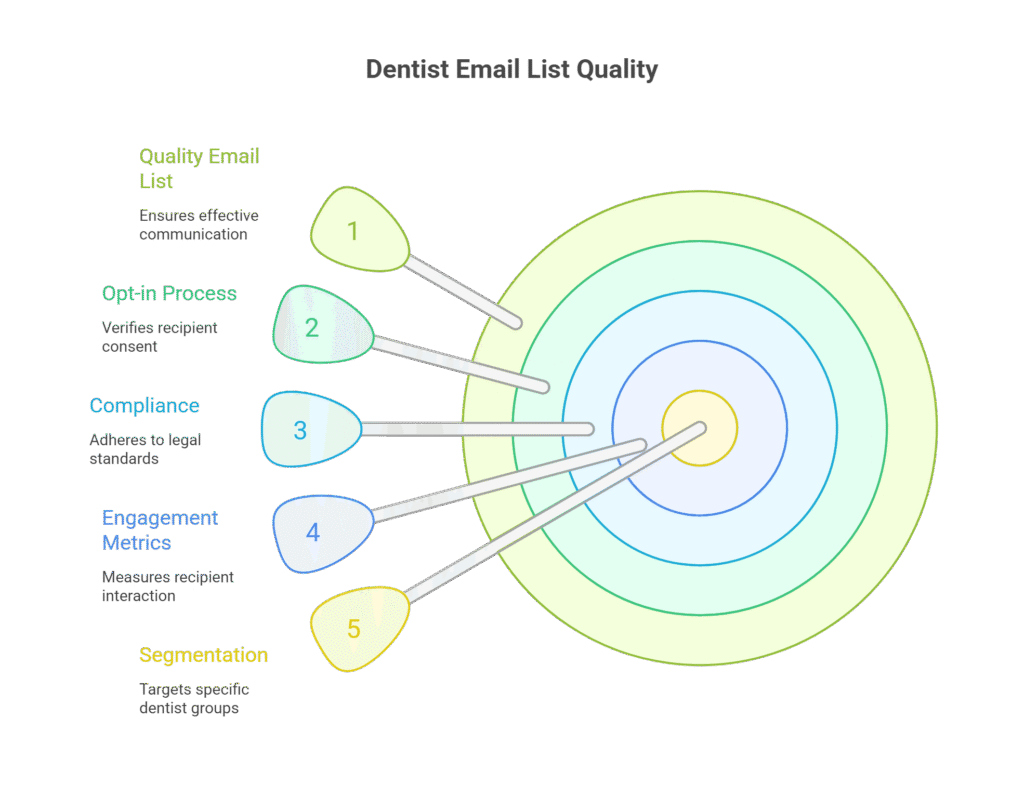
5 Critical Elements Every Quality Dentist Email List Must Include
Healthcare marketers waste an average of $47,000 per campaign using unverified email lists, with dental industry campaigns suffering even higher losses due to the specialized nature of dental practice communication.
This staggering figure represents more than just financial waste – it encompasses damaged sender reputations, compliance violations, and missed opportunities to connect with dental professionals who could benefit from your products or services.
The dental industry presents unique challenges for B2B marketers. Unlike other healthcare sectors, dental practices operate as independent businesses with distinct decision-making processes, regulatory requirements, and communication preferences. Traditional email marketing approaches often fall short when applied to dental marketing lists, leaving marketers frustrated with poor engagement rates and compliance concerns.
Email marketing remains one of the most effective channels for reaching dental professionals, with healthcare email campaigns generating an average ROI of $42 for every dollar spent. However, this success depends entirely on the quality of your dentist email database.
A poorly constructed dental email marketing list can transform your most promising campaign into a costly mistake that damages your brand reputation and exposes your organization to regulatory penalties.
A quality dentist email list must include five critical elements – data accuracy, regulatory compliance, comprehensive contact details, segmentation capabilities, and regular updates – to ensure successful healthcare marketing campaigns and protect your business from costly mistakes.

These elements work together to create a foundation for effective dental industry marketing that generates results while maintaining the highest standards of professionalism and compliance.
Verified Data Accuracy and Source Transparency
The foundation of any successful dental email marketing campaign rests on data accuracy. Unlike consumer email lists where a moderate bounce rate might be acceptable, healthcare email marketing demands precision.
Every invalid email address in your dentist mailing list represents a missed opportunity to connect with a potential customer and contributes to sender reputation damage that can impact future deliverability.
Real-time verification processes separate quality dental email marketing providers from budget alternatives. Professional verification involves multiple validation steps, including syntax checking, domain verification, and mailbox confirmation.
For example, when comparing bounce rates between verified and unverified lists, quality providers typically achieve bounce rates below 2%, while unverified lists often exceed 15%. This difference dramatically impacts campaign performance and sender reputation.
Source transparency becomes crucial when evaluating dental practice email database providers. Reputable suppliers clearly document their data collection methods, whether through professional association partnerships, conference registrations, or direct practice surveys.
This transparency allows marketers to assess data quality and ensure compliance with various regulations. Providers who refuse to disclose their data sources often rely on questionable collection methods that can expose your organization to compliance risks.
The impact on sender reputation cannot be overstated in healthcare lead generation. Email service providers closely monitor bounce rates, spam complaints, and engagement metrics. A single campaign with poor data quality can result in your domain being flagged, affecting all future email marketing efforts.
One medical device company discovered this reality when their sender reputation score dropped from 95 to 23 after using an unverified dental email list, requiring six months of careful reputation management to recover.
Industry standards for acceptable bounce rates in healthcare email marketing hover around 2% or lower. Quality dentist contact database providers guarantee these standards and often provide detailed analytics showing verification results. This level of transparency allows marketers to confidently invest in campaigns knowing their foundation is solid.
Full Regulatory Compliance Framework
Healthcare marketing operates under more stringent regulations than most industries, and dental email marketing is no exception. HIPAA compliance requirements extend beyond traditional patient information to include marketing communications with healthcare professionals.
While HIPAA primarily governs patient data, dental marketing lists must be collected and maintained with careful attention to privacy requirements and professional standards.
The average HIPAA violation penalty ranges from $137 to $2 million per incident, depending on the severity and scope of the violation. Even unintentional violations can result in significant penalties, making compliance a critical business imperative rather than a mere legal consideration.
Quality dentist email list providers implement comprehensive compliance frameworks that protect both their operations and their clients from regulatory exposure.
CAN-SPAM Act adherence forms another crucial compliance layer for dental industry marketing. Proper consent documentation becomes essential when marketing to healthcare professionals, as unsolicited commercial emails can result in penalties up to $46,517 per violation.
Quality providers maintain detailed opt-in records, including timestamps, source information, and consent language. For example, proper consent documentation should include clear identification of the sender, honest subject lines, and easy unsubscribe mechanisms.
State-specific regulations add another compliance dimension to dental email marketing. California’s privacy laws, New York’s professional communication requirements, and other state-level regulations create a complex compliance landscape.
International considerations become relevant for companies marketing dental products globally, as GDPR and similar regulations impose additional requirements on data collection and processing.
Penalty ranges for non-compliance vary significantly based on jurisdiction and violation type. CAN-SPAM violations can reach $46,517 per email, while GDPR violations can cost up to 4% of annual revenue. These potential penalties underscore the importance of selecting dental email marketing providers who maintain comprehensive compliance frameworks rather than cutting corners to reduce costs.
Comprehensive Contact Information Depth
Basic email addresses provide insufficient information for effective dental marketing campaigns. Quality dentist email lists must include comprehensive contact information that enables personalization and targeted messaging. Essential data fields extend far beyond simple email addresses to include practitioner names, practice names, specialties, locations, and phone numbers.
Minimum required fields for professional dental email marketing include practitioner full name, practice name, specialty designation, complete address, phone number, and email address. Additional valuable fields might include practice size, years in practice, education background, and technology adoption indicators. This comprehensive information enables marketers to craft messages that resonate with specific dental professional segments.
Practice-specific information becomes crucial for personalization, which significantly impacts campaign performance. Healthcare email marketing campaigns with personalized subject lines achieve 26% higher open rates compared to generic campaigns.
For dental professionals, personalization might include references to practice size, local dental community involvement, or specialty-specific challenges. This level of personalization requires detailed contact information that goes beyond basic demographics.
Decision-maker identification presents unique challenges in dental email marketing. Unlike large healthcare organizations with complex hierarchies, dental practices typically have clear decision-making structures centered around practice owners, associates, or office managers.
Quality dental practice email databases clearly identify these roles, enabling marketers to tailor messages appropriately. For example, equipment purchase decisions might target practice owners, while continuing education opportunities might focus on associates and hygienists.
Different messaging approaches prove necessary for various dental professional roles. Practice owners respond to business-focused content emphasizing ROI, efficiency, and patient satisfaction. Associates might prioritize clinical effectiveness and career development opportunities.
Office managers focus on operational efficiency and patient communication tools. Comprehensive contact information enables this role-based messaging approach.
Advanced Segmentation and Targeting Capabilities
Geographic and demographic segmentation options enable precise targeting for dental email marketing campaigns. Urban dental practices face different challenges than rural practices, influencing their receptivity to various products and services.
Urban practices might prioritize efficiency and advanced technology, while rural practices might focus on cost-effectiveness and reliability. Quality dentist mailing lists provide detailed geographic segmentation that enables these targeting distinctions.
Practice size significantly impacts purchasing decisions and communication preferences. Solo practitioners operate differently than group practices or dental service organizations. Response rate variations by practice size can be substantial, with solo practitioners showing 34% higher engagement rates for cost-focused messaging, while large group practices respond better to efficiency and integration-focused content.
Specialty-based filtering becomes essential for product-specific marketing campaigns. Orthodontists, oral surgeons, and general dentists have distinct needs and interests. A periodontal instrument manufacturer achieves better results targeting periodontists and oral surgeons rather than general dentists. Quality dental email marketing lists provide detailed specialty segmentation that enables this precision targeting.
Technology adoption indicators provide valuable segmentation opportunities in dental industry marketing. Practices with electronic health records, digital imaging, or online scheduling systems demonstrate higher technology adoption rates and might be more receptive to innovative products. Digital readiness scoring helps marketers identify practices most likely to embrace new technologies, improving campaign ROI.
Practice modernization levels vary significantly across the dental industry. Newer practices or recently renovated facilities might prioritize cutting-edge technology, while established practices might focus on proven solutions. Quality dentist contact databases include practice age, recent renovations, and technology adoption indicators that enable sophisticated targeting strategies.
Regular Database Maintenance and Update Protocols
The dental profession experiences significant mobility, with practitioners frequently changing practices, retiring, or relocating. Healthcare professional mobility statistics indicate that 23% of dentists change practice affiliations annually, making database maintenance crucial for campaign success.
Outdated contact information leads to bounce rates, delivery failures, and missed opportunities to connect with target audiences.
Frequency of data updates varies among dental email marketing providers, but quality suppliers update their databases at least quarterly. Some premium providers offer monthly updates for rapidly changing markets or high-priority segments.
These regular updates ensure that your dental marketing lists remain current and deliverable, protecting your sender reputation and campaign effectiveness.
Automated bounce processing and list hygiene represent essential maintenance components. Quality providers implement automated systems that immediately process bounced emails, suppress invalid addresses, and flag potential issues.
This automation ensures that your dental practice email database remains clean without requiring manual intervention. For example, automated suppression list management removes unsubscribed addresses, bounced emails, and spam complaints from future campaigns.
Ongoing compliance monitoring becomes increasingly important as regulations evolve. Healthcare marketing regulations change frequently, requiring constant vigilance to maintain compliance. Quality dentist email list providers monitor regulatory changes and adjust their practices accordingly.
This proactive approach protects clients from compliance issues that could arise from regulatory updates.
Database refresh cycles should align with your marketing calendar and campaign frequency. High-volume senders might require monthly updates, while quarterly campaigns might succeed with less frequent refreshes. Quality providers offer flexible update schedules that match client needs while maintaining data accuracy and compliance standards.
Final Thoughts
The five critical elements of quality dentist email lists – verified data accuracy, regulatory compliance, comprehensive contact information, advanced segmentation capabilities, and regular maintenance protocols – work together to create a foundation for successful dental marketing campaigns.
These elements are not independent features but interconnected components that collectively determine campaign success and business protection.
Data accuracy ensures your messages reach intended recipients while protecting sender reputation. Regulatory compliance frameworks protect your organization from costly violations while maintaining professional standards.
Comprehensive contact information enables personalization and targeted messaging that resonates with dental professionals. Advanced segmentation capabilities allow precise targeting that improves response rates and ROI. Regular maintenance protocols ensure your investment remains valuable over time.
The interconnected nature of these elements means that weakness in any area can undermine overall campaign effectiveness. A compliant list with poor data accuracy will still generate high bounce rates. Accurate data without proper segmentation capabilities limits targeting effectiveness. Comprehensive information without regular updates quickly becomes outdated and unreliable.
When selecting dental email marketing providers, prioritize quality over quantity. A smaller, high-quality dentist email database will consistently outperform larger, unverified lists. Implement multi-point verification processes before launching campaigns, including data accuracy checks, compliance reviews, and segmentation validation.
Establish ongoing compliance monitoring protocols that keep your campaigns aligned with evolving regulations.
The dental industry offers substantial opportunities for B2B marketers who approach it with appropriate tools and strategies. Quality dentist email lists provide the foundation for these successful marketing efforts, enabling meaningful connections with dental professionals who can benefit from your products or services.